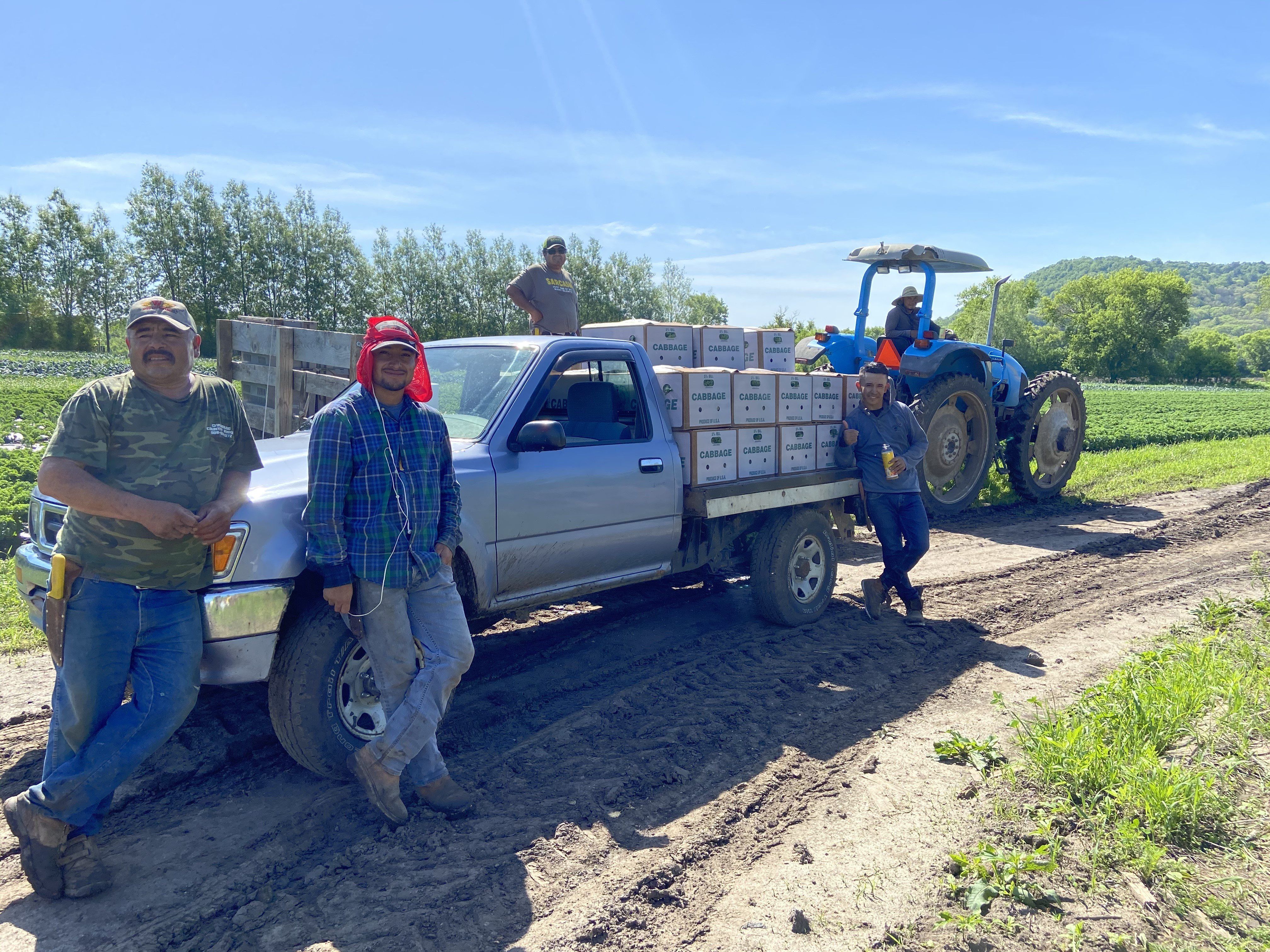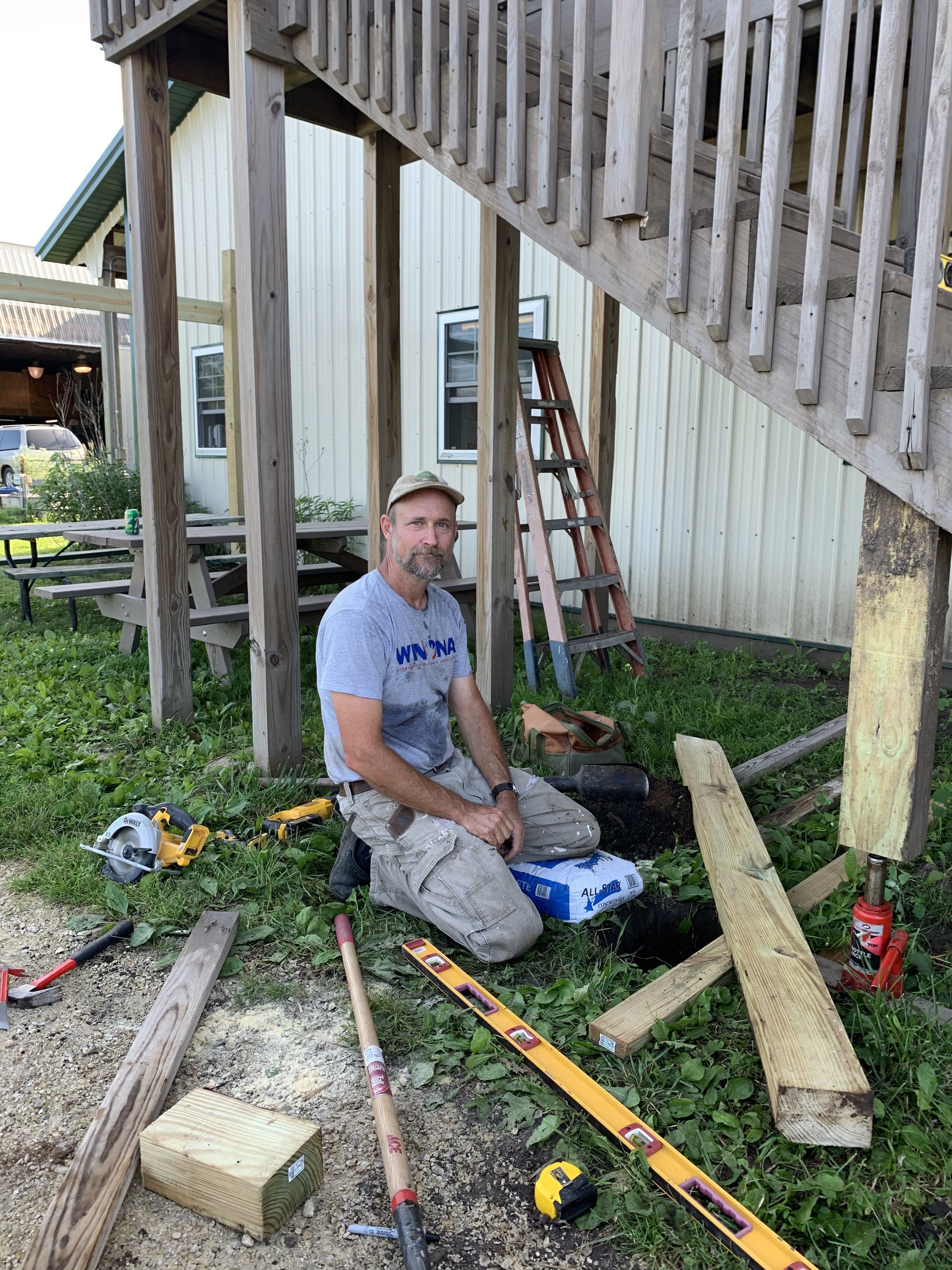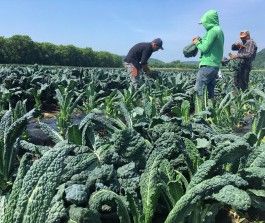There are some details about farm work that slip away when you are far from it. I did not plan to be back at Featherstone this summer, but coronavirus disrupted plans. My day job as a graduate student is now done over Zoom, compressed for the moment into two-dimensions. I wanted my old job back, part-time, out of a desire to re-inhabit the three-dimensional world. On Wednesday afternoon, I watched my friend defend his dissertation prospectus in front of a digital panel of professors over Zoom. The next morning, at 5:30 AM, I punched in at Featherstone.
The first detail: beads of water collect along the edges of kale leaves, held in the ridges of the leaf. They glisten, a little, in the pale morning light, and soaked my pants, mid-thigh to the hem, upon entering the field. Some of my coworkers cut a little path for themselves to avoid that fate, wielding harvest knives like machetes. By extension, I forgot how heavy work boots become when wet, clay accumulating around the sides, then drying, cement-like.
I spent the morning harvesting kale with Victor’s crew. I had not seen most of them since my visit to Guanajuato in January. Victor showed me photos of his new baby girl with her older brother, who is in preschool and knows all the words to “Calma” by Pedro Capó. He sometimes sings them with a shy smile.
The second detail: the first callous that returns to my hand when bunching kale is on the thumb of my right hand. That is the hand that ties the twist-tie and is pinched slightly by hundreds of bunches. I always underestimate how many twist-ties I will use during a harvest, stuffing my pocket full only to empty it and ask whoever is next to me for more. I similarly forget how a pile, un montón, of bunches looks larger than it is in reality, made evident once it is packed into 24-bunch boxes. A heaping pile of green kale might fill two boxes, and the pick list asking for sixty boxes feels suddenly longer. I work to keep up with my coworkers. I have a scar on my index finger from rushing to keep up on a pick a couple years ago. Now, I aim for a consistent, steady pace. Some of the best workers I have seen do not appear to be working hard. I think about my economy of motion—how to reduce the unnecessary motions, whether it is quicker to tie first and then cut edges or cut edges and then tie, how to harvest lacinato quickly without snapping the plant. Like I wrote about in a newsletter last summer, doing this job well takes an impressive amount of skill. I feel always like a pupil here. Alejandro played “El Corrido de Juanito” by Calibre 50 on his speaker, which hangs off his belt: “They haven’t felt fear/ They haven’t seen a migra truck/ Or a deportation/ Or a deportation” (my translation).
The third detail: Victor harvests broccoli in five quick motions. One to cut and then “uno, dos, tres, cuatro,” to clear the stems and end with a straight slice on the bottom. He counted them aloud to me. It sounded like a waltz. Gerardo told me to grit my teeth when making the first cut; he said it makes the motion more powerful, then his gritted teeth gave way to a grin. He loaned me his knife during the harvest. He pointed out the places on my knife where I made mistakes on the bench grinder, where the blade was not evenly sharp. When I still couldn’t cut the broccoli in five quick motions, Gerardo laughed. The air smelled of tractor fumes and yellowing broccoli leaves.
It was in the high 80s by late morning. The bed of the flatbed was too hot to sit on. We stood as we drove in, Juan Manuel resting his hand on my shoulder for stability. We talked about the four crew members who have been struggling to renew their passports since the foreign affairs office closed there in response to the coronavirus. They have been in a limbo caused by changing opening dates and lack of communication from the office, which, in turn, has cost them crucial time in an already shortened season. We talked about three other crew members who are in limbo for a different reason: denied the visa, pending review, by the U.S. Department of State as a punishment for previous undocumented migration. The latter process, unlike the former, has become something of a routine—denial, review, eventual admittance for some—a slow, grinding, multi-year penalty.
When we got to the next field, we unloaded wax boxes, paper, and rubber bands and got to work again, talking, in midday heat, about cold beers and paychecks.
With Gratitude,
Shelby O'Neill
Harvest Crew




